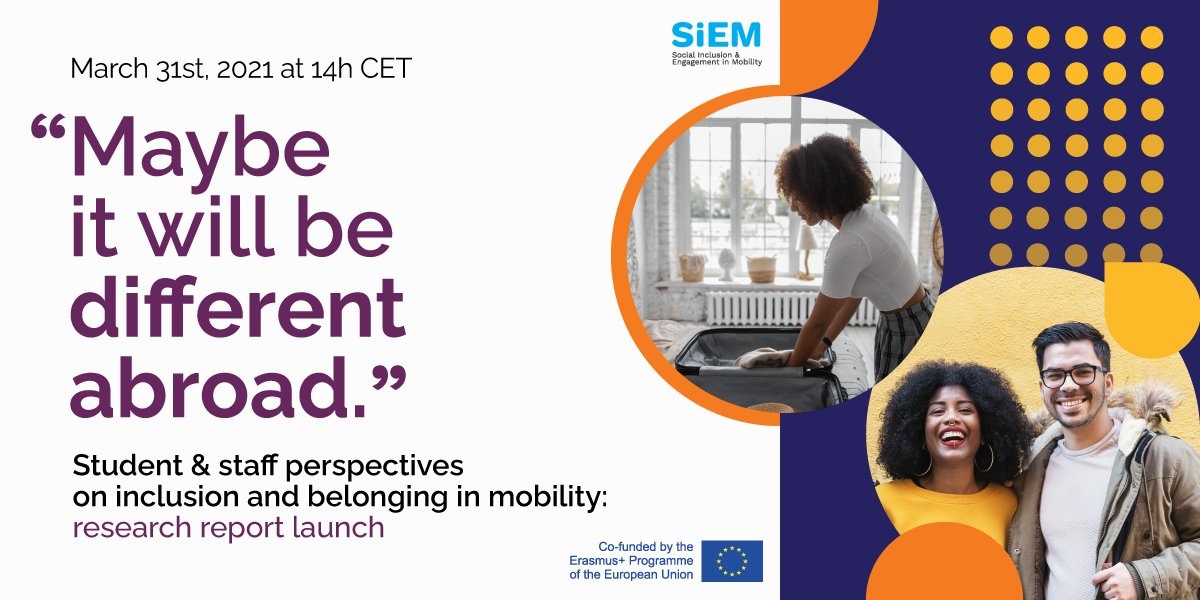
The first outputs of the Social Inclusion and Engagement in Mobility (SIEM) project were presented during an online conference on March 31st, 2021. The event was attended by around 200 people, student and higher education institution representatives in majority, interested in finding out the outcomes of the SIEM research that took place from February to May 2020.
The Erasmus Student Network (ESN), together with partners, launched the SIEM project in response to the low participation of students with fewer opportunities in mobility programmes. Its aim is to widen the participation of underrepresented groups in the Erasmus+ programme in order to make international student mobility more inclusive, and increase the interaction between international students and local communities of underrepresented groups and the visibility of international student mobility.
You can find the full recording of the webinar on ESN’s Facebook page.
The research survey targeted both mobile and non-mobile students, as well as university staff. In the course of 2020, the SIEM team analysed the answers from over 12.000 students and 750 staff members across Europe and beyond, which were presented in the comprehensive 130-page report titled “Maybe it will be different abroad: Student and Staff Perspectives on Diversity and Inclusion in student exchanges”, available on the project website: https://siem-project.eu.
The key findings and recommendations were presented during the webinar by Celia Partridge, Assistant Director, Partnerships and Mobility at UUKi, and Wim Gabriels, Policy and Project Manager at the Erasmus Student Network.
The biggest #barrier to #mobility is the financial one. By far the most practical barrier is needing to advance the initial cost; students are not able to pay the costs for departing to their mobility, not only to support their period abroad. #SIEM pic.twitter.com/iTwptQDK5L
— ESN International (@ESN_Int) March 31, 2021
Unsurprisingly, the biggest barrier for student mobility remains the financial aspect of it. The research found that less than 20% of mobile respondents had at least 75% of their mobility costs covered by a grant or scholarship, while at the same time 53% of non-mobile respondents reported needing at least 75% of the mobility programme costs to be covered by funding if they were to go abroad. This number increases with students from low-income households and those from ethnic minority groups.
When it comes to recommendations, the report suggests having a clear definition of what “fewer opportunities” means and developing a strategy that includes mobility targets for underrepresented groups. The presenters highlighted that every organisation in the chain has a role to play - from the European Commission, to National Agencies and universities. Next to that, it is important for students to receive their fundings on time, in the very beginning, to cover their costs as they come.
As a final recommendation regarding the strategy and offer, we suggest working with students. Institutions to include them in the strategy development; “nothing about us without us”.
Wim Gabriels, Policy and Project Manager at the Erasmus Student Network
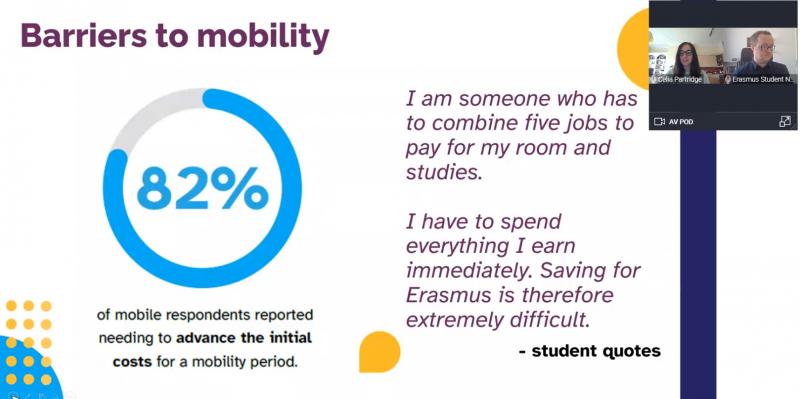
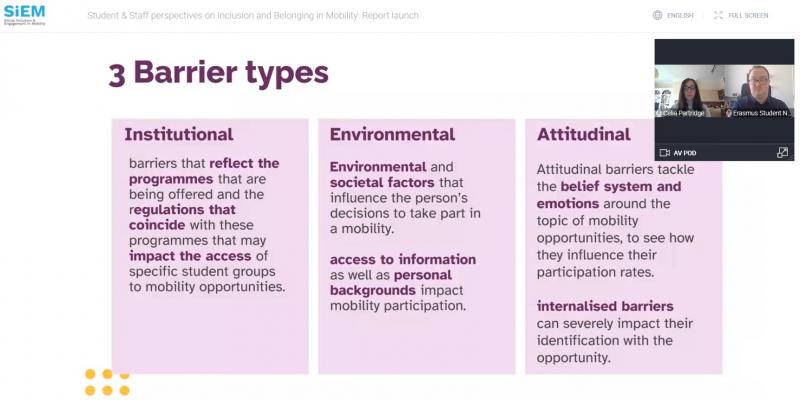
The presentation about the research was followed by a panel discussion on how to widen the participation of underrepresented groups in mobility programmes. Kristina Hauschildt from EUROSTUDENT reminded the participants that intersectionality should not be neglected when discussing inclusion, as “several characteristics can be combined for one student, there are multiple barriers one student can encounter”.
Marta Gutierrez Benet, Erasmus+ Programme Coordination at the European Commission, said that a lot of recommendations the survey proposes are something that is already being worked on. She agrees that more work needs to be done to make the programme truly inclusive, and that the regulations for the new Erasmus+ programme include a chapter dedicated to this.
For higher education, we have a system of scholarships that also needs to offer flexibility to the national level to adapt to their reality. For any kind of participant, the level of the grants that we have proposed in the 2021 call are already increased by 15%. We have widened the concept of fewer opportunities and we adjusted the amount of top-up.
Marta Gutierrez Benet, Erasmus+ Programme Coordination at the European Commission
Providing the voice of students, Ronja Hesse from the European Students’ Union emphasised the key role students and student organisations have in making international students feel included at their host institutions. For her, it is all about peer to peer engagement, support through buddy systems and helping students integrate more into the local community by offering social events.
Irina Ferencz, Director at the Academic Cooperation Association, expects an acceleration from the National Agencies in their communication and to make communication more inclusive. This is to be done both by simplifying the application process, but also by featuring more diverse students in the communication surrounding the programmes.
For me it was really scary because there really is a lot of papers and it’s hard to fill it all correctly and scan it and then upload it to the right place and sign it all... mentally it’s really keeping you from even getting into it.
A student respondent
Final speaker was João Bacelar, Director at the European University Foundation, who presented the guidelines for universities. The handbook is developed for International Relations Offices working with in- and outbound student mobility, primarily within the Erasmus+ programme. It contains review forms and checklists meant to help universities assess their own diversity and inclusiveness, and provide them with ideas and strategic actions they should consider. Additionally, the guidelines contain information on the preferences of students that the universities can take into consideration when promoting various exchange opportunities.
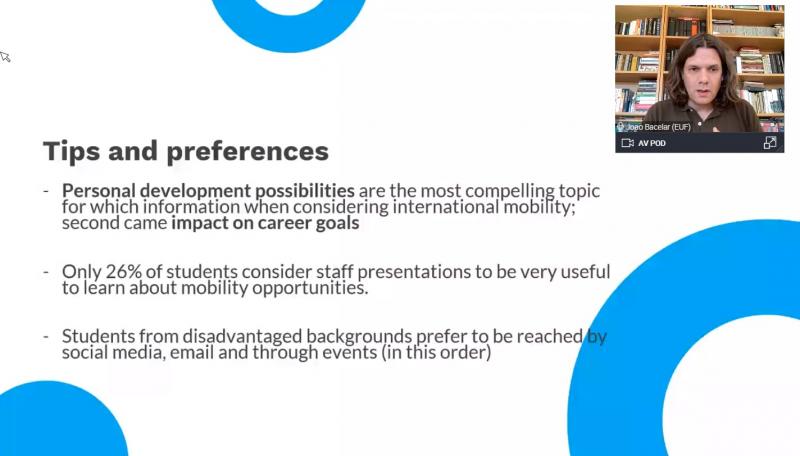
Wim Gabriels closed the webinar by presenting the next steps for the project and inclusion in mobility as a whole, which include diving deeper into the report findings and creating individual fact sheets for target groups and countries. Furthermore, training for higher education institutions on inclusive mobility promotion will follow in the spring of 2021 and more focus on the engagement of mobile students with the local community and integrations. Lastly, the launch of the InclusiveMobilty.eu portal will take place on April 22nd, 2021. The platform features specific tools supporting Ministries of Education, National Agencies and higher education institutions to install a sustainable inclusive mobility strategy at the national and institutional level. You can register for the event here.
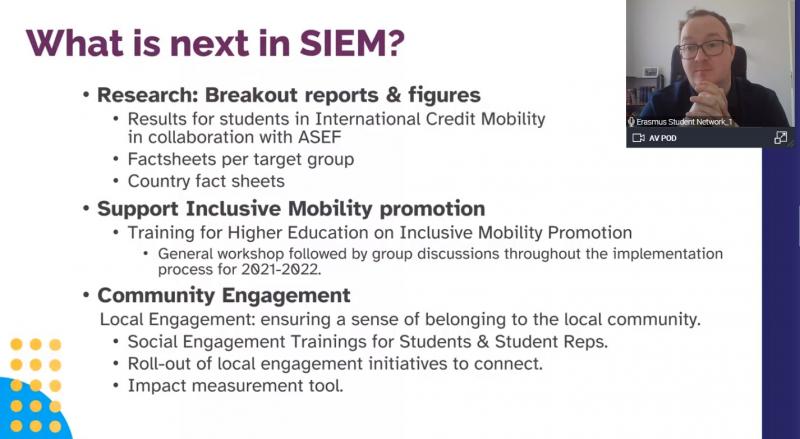
Want to stay informed about the future of the SIEM project? Sign up for the newsletter!

Follow ESN